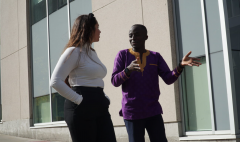Available in Français
The first event of the 2023-2024 MDS Speaker Series took place on Monday, September 25th, featuring Deo Mwapinga, a Doctorate Candidate in the Department of Political Sciences at Carleton University. Deo is currently a researcher with the Local Engagement Refugee Research Network (LERRN) and a contributor to the LERRN Tanzania Working Group. The event, held at Richcraft Hall, focused on Mwapinga’s dissertation titled “The politics of solutions for refugees: Lessons from the naturalization of Rwandese and Burundian Refugees in Tanzania.”

Description: Georgiana Ghitau and Deo Mwapinga discussing his research outside the Canal Building at Carleton University. Photo credit: Jarukson Jeevakumar and Beatrice Marie Villadelgado
Mwapinga’s research addresses the global challenge of finding solutions for refugees, with the average duration of a refugee situation now lasting 20 years. He highlighted the three traditional solutions for refugees: repatriation, resettlement in a third country, and integration in the host country. The case of Tanzania is particularly interesting, as it has granted citizenship to large groups of refugees twice – Rwandese refugees in the 1980s and Burundian refugees in the 2010s.
The presentation aimed to explore why the experience of naturalized Rwandese refugees in Tanzania has been perceived as more successful compared to that of naturalized Burundian refugees. Mwapinga drew on recent fieldwork in Tanzania and his own experience as a former Tanzanian government official to provide insights into this variation.
During the event, Mwapinga discussed the formal introduction of citizenship to ex-refugees in a post-democratization era and the new areas of contestation it has created. He argued that the politics of naturalization should not be limited to the dichotomy of de facto (the practical/factual recognition of an individual as a citizen, regardless of their legal status, even if they do not possess formal citizenship documents) and de jure (the legal recognition of an individual as a citizen according to the laws and regulations of a country) citizenship. Instead, he proposed advancing the understanding of local integration as a triad and introducing the concept of “quasi-citizenship” to capture the transitional state of citizenship for ex-Barundi refugees.
Mwapinga brings a unique perspective to his study. His involvement in the issuance of citizenship certificates to former Burundian refugees in 2014 sparked his interest in studying the impact of their new legal status on their daily lives. His research project explores the relationship between their citizenship status, membership in the political community, and the perception of (in)security resulting from out-groups.
Overall, the event provided valuable insights into the politics of solutions for refugees and the complexities of naturalization processes. Mwapinga’s research contributes to the understanding of local integration and challenges the conventional understanding of naturalization as a durable solution for refugees. The audience gained a deeper understanding of the dynamics and implications of citizenship for refugees in Tanzania and beyond.
This report was prepared by Georgiana Ghitau, LERRN Knowledge Mobilization and Translation Officer.
Watch the video below!